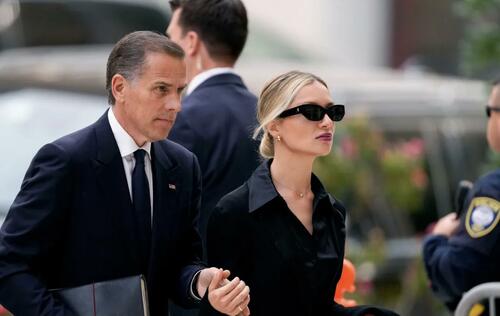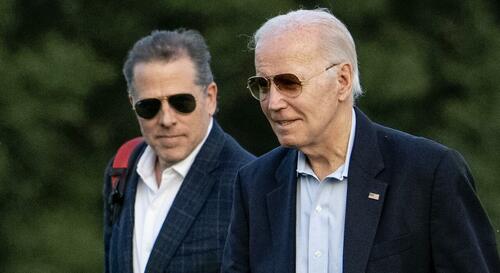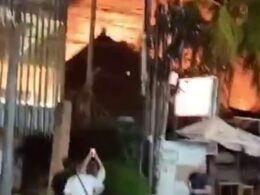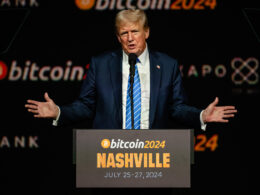While Joe Biden was vice president, his son Hunter attempted to obtain State Department assistance in securing a deal for Ukrainian gas company Burisma, of which Hunter was a highly-compensated board member despite having no experience in its industry, the New York Times reported on Tuesday. The revelation of the 2016 episode underscores allegations that Hunter sought to enrich himself by trading on his father’s influence.
The Times report draws on newly-released government records pertaining to Hunter’s pushing of a Burisma deal in Italy. The Biden White House had resisted releasing the files for years, only to relent soon after Biden was pressured into abandoning his reelection bid.
Less than a week after Joe Biden dropped out of the presidential race, the State Department finally released records showing Hunter Biden sought U.S. government help to land a Burisma deal when his father was VP.
Coincidence? 🤔 https://t.co/CZjuDfgYqM
— Oversight Committee (@GOPoversight) August 14, 2024
The Times says it was unable to read Hunter’s email to the US ambassador, as it appears to have been “redacted in its entirety” somewhere within the trove of documents turned over by the government. However, in communications sparked by Hunter’s 2016 inquiries, federal government officials appear to have been anxious about Hunter’s request. For example, a Commerce Department official assigned to America’s embassy in Rome wrote:
“I want to be careful about promising too much. This is a Ukrainian company and, purely to protect ourselves, USG should not be actively advocating with the government of Italy without the company going through the [Commerce Department] Advocacy Center.”
The White House told the Times that then-Vice President Biden had no knowledge of his son’s inquiries. Hunter’s attorney, Abbe Lowell, acknowledged that Hunter asked US ambassador to Italy John R. Phillips and “various people” for help facilitating a dialogue between the president of Tuscany and Burisma leaders. “No meeting occurred, no project materialized, no request for anything in the U.S. was ever sought and only an introduction in Italy was requested,” Abbe told the Times. Burisma was pursuing a geothermal energy project.
Though Burisma didn’t respond to inquiries, an unnamed businessman associated with the Italian machinations told the Times that Biden’s moves came when Burisma or partner entities were struggling to obtain regulatory approval for a geothermal project. The initiative was also the subject of communications that were found in Hunter’s infamous laptop, which he abandoned at a Delaware repair shop. For example, Hunter business partner Eric Schwerin wrote an email to an Italian businessman who had connections to Tuscany’s president. “Burisma is hoping that some of its executives can get a meeting with the president to discuss their geothermal business in Tuscany,” he wrote in July 2016.
Meanwhile, the government records seem to suggest a persistent effort by Hunter across multiple US government channels. “The Ambassador already replied to one letter from Mr. Biden. He may be shopping for more support than he got here,” a Commerce official emailed other federal officials.
Then-Ambassador Phillips told the Times that he didn’t remember Hunter’s request. “I certainly would pay attention to it,” he said. “Out of courtesy, I’d probably make sure he got a response of some sort, but not necessarily from me. And I wouldn’t even want to encourage it, because I wouldn’t get us involved in something like that.”
The New York Post reported that Burisma was paying Hunter $83,333 a month for his board service, but cut his compensation in half two months after his father’s stint as vice president ended. An NBC News analysis of information on Hunter’s laptop showed that he and his firm raked in $11 million between 2013 and 2018 from his work with Burisma and a Chinese businessman who’s been accused of fraud.
Hunter is facing a September trial on charges that he evaded millions of dollars in taxes on his Burisma and other overseas wheeling and dealing. He’s seemingly also at peril for not having registered under the Foreign Agents Registration Act (FARA). In a filing last week, prosecutors mentioned they had evidence Hunter contacted the State Department at the behest of a Romanian real estate tycoon who is himself facing corruption charges. They said they had no current plan to add a FARA charge, but the Times said the feds’ choice to raise the specter of a new indictment was considered a “pressure move.”
What other skeletons will emerge now that Joe Biden’s political fortunes are no longer an issue?









